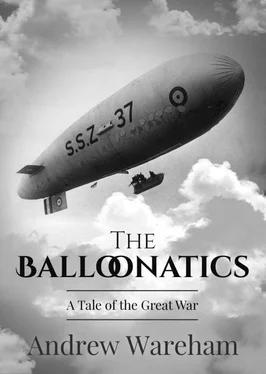“Quite right, Commander. We are English, not a bunch of dagoes who don’t know what discipline means.”
The whole table honestly agreed with their Colonel.
Peter remembered Bracegirdle speaking of marching into uncut wire defended by machine guns, of losing one half of the men in a single action. That was the other side of blind acceptance of one’s orders.
He said nothing, unable to think of a sensible response. That would require many years of thought and possibly a better educated brain than his. For the while he could only respect their integrity.
The table broke up and he and Griffiths changed into their flying dress, putting on their scarves and gloves and long leather overcoats and exchanging peaked caps for flying helmets.
Colonel Secombe-Askey wished them well before handing them over to his adjutant.
“How many men do you need, Commander?”
“We normally have fifty to hold the nacelle steady and control the blimp until we have engine power, sir.”
“Two companies will be best.”
“Thank you, sir. One officer to command the ground party, please. Keep everything attached until we have started the engine, then unhook the mooring ropes as quickly as possible. Keep hold of the single trailing rope until I call the release, sir.”
“I will do it. Sounds simple.”
“It is, sir. One strong man to swing the propellor as well, sir. I will tell him exactly what to do.”
Peter looked about him for the lieutenant commander from Intelligence.
“He left for London while you were asleep, sir. Said he could do no good standing around and watching you take off.”
The adjutant made it clear that he was unimpressed by the man’s attitude – it was not how they did things in his regiment.
“If you will come on out to the field, sir. I think we have everything ready for you.”
There were two captains and more than a hundred men, most of them looking interested in the balloon, a change from their ordinary routine.
“Light cloud cover, sir, and a half moon. Just right for a night journey. All ready here, sir.”
They produced a corporal standing well over six feet and built in proportion, a farm boy from his voice.
“First time, we simply prime the cylinders. I will call to you and you give the propellor a single slow spin. Then I will shout ‘switches on’ and you will heave the propellor as hard as you can and step back fast, out of its way. If the moving blade hits you, it will kill you. So you must keep your balance and step back. If all goes well, the engine will start on that first hard swing. If it does not, wait for me to order you to start again. Don’t step in close until I tell you it’s safe.”
“Roight you are, zur. Once round quiet like. You shouts switches and then I really give ‘er a sharp old tug and get out the bliddy way. If so be it don’t work, keep back till you gives I the word.”
“Just that, Corporal. Ready now?”
“Arr, no worries, like, zur.”
The engine started obediently and Peter shouted his thanks.
“Release mooring guys.”
The four ropes were unhooked in seconds, a sergeant who had watched the earlier mooring supervising.
“Let go the trailing rope.”
Griffiths heaved the rope in, the sole part of his job requiring any strength.
Peter set the fins to rise.
“Handling party, step back.”
They let go of the nacelle and the blimp made its normal rushing ascent, controlled by the engine. Peter managed a single wave as he steered due south to make height. Ten minutes later he came back over the field at three thousand feet, still rising slowly.
“Got the fires, Griffiths?”
“Spotted, sir. I reckon a wind of about eight miles an hour, sir. Sou’westerly. Crossing the Trenches in about ten minutes, sir.”
It was almost full night and Peter was fairly sure they would not be seen at height. No aeroplanes flew at night, he knew, other than a few experimental sorts which would be back at the factories. He need not fear ground fire above four thousand feet – he would be out of the range of the few machine guns that were set up on high angle mountings and invisible, he hoped, to anything bigger.
The sole problem was discovering their landing ground.
“Railway line, sir. Port, about two miles. Train coming south.”
The old main line from Brussels to Ypres was still in use on the German side of the lines. They had been told it was busy with troop trains and ration and ammunition carriers every night. Their landing ground was in sight of the line.
Peter adjusted course and followed the line north, passing over a few small towns, none of which he could certainly identify on his chart.
“A road to the east, sir. Busy, sir. Looks like lorries in a convoy, a dozen pairs of headlights spaced close together in a block. Quite a lot of weaker lights, single lanterns, maybe. Perhaps horse-drawn wagons, sir?”
It was reasonable to expect many more horses than motor vehicles.
The distance between road and railway was not much more than five miles, Peter thought. Close enough that traffic on one or the other might spot a balloon circling low.
They flew on, seeing no interruption in the flow of vehicles. It seemed likely that they might stop if they spotted a balloon, unless they assumed it was one of their own. Not very likely that the British or French would be sending balloons out in the night, after all.
“Should be coming up on the site, sir. Passing more small villages – the map shows more built-up areas as you get closer to Brussels. I can see a river near the railway tracks, sir.”
They needed to come in low if they were to pick up the weak lamps on the ground.
“Dropping to one thousand.”
Peter adjusted the fins and throttled back, gliding slowly and quietly down. The cloud cover was thinner, giving a little moonlight, possibly enough to disclose the big blimp, too little to show much underneath them.
There was a faint metallic rattle from the front cockpit.
“Lewis cocked, sir.”
Peter eased the pistols at his hips, wondering if he might need them.
“Lights, sir. Five of them, making a tee shape, three north south, one out either side at the north end. Close to the river, sir.”
“Good. Going down. Can you see anything further out?”
“No. Clear, sir.”
Peter aimed towards the southernmost light, brought the blimp in over it, the nacelle bumping on the turf. He glanced at his watch, just before midnight. Figures ran towards him, indistinct in the darkness.
“From the Office?”
It seemed unlikely that there would be other balloons wandering about the area. Peter called back that he was.
“We have a cart. Let us bring it across.”
“Keep clear of the propellor, to the front.”
The balloon was bumping and surging under the impetus of the engine. He could not switch off.
“Hurry!”
They scurried in the night; a darker, larger lump appeared, showed itself as a pony and trap. He pulled out the first sack, hauled it across at full stretch of his arms, not too heavy but awkward to handle from the cockpit with its limited space to turn.
Second then third and a shout from the distance.
“There is a patrol on the road. Coming this way. Quickly!”
He grabbed the fourth sack, pushed it across. They dropped it, wasted seconds picking it up again.
“Get clear. I am taking off now. Griffiths, ready to open fire.”
The cart moved away, slowly across the grassland towards a track to the south. There was more shouting and then a shot on the roadway leading across from the west, the direction of the railway line. Staring across, Peter thought he could see carriages stationary on the line, as if a troop train had spotted the blimp, halted and sent out a platoon, or more, to investigate.
Читать дальше












